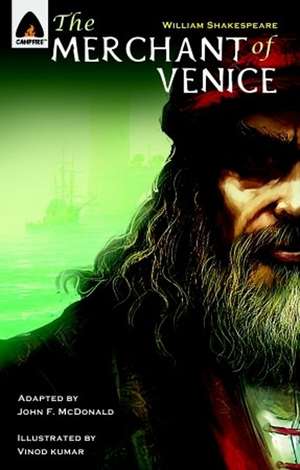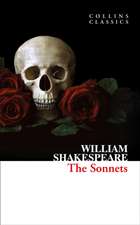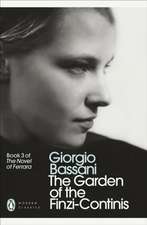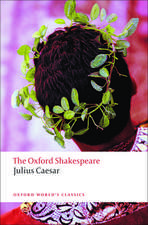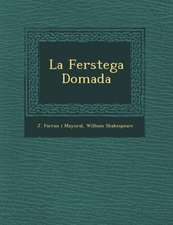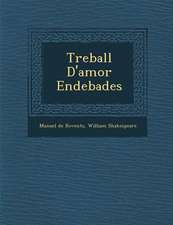The Merchant of Venice
Autor William Shakespeareen Limba Engleză Paperback – 24 mai 2011
Preț: 56.48 lei
Nou
10.81€ • 11.17$ • 8.100£
Carte disponibilă
Livrare economică 04-18 martie
Specificații
ISBN-10: 9380028598
Pagini: 80
Ilustrații: colour illustrations
Dimensiuni: 165 x 260 x 4 mm
Greutate: 0.2 kg
Editura: Penguin Random House Group
Colecția Campfire
Locul publicării:New York, United States
Descriere
What was Shakespeare's attitude to Semitism? The Introduction to this edition of The Merchant of Venice opens by addressing this vital issue raised by the play, and goes on to study the sources, background, and date, includuing a discussion of Sigmund Freud's essay on 'The Three Caskets'. Professor Halio interprets the play's contradictions, inconsistencies, and complementarities, especially as these relate to the overarching theme of bonds and bondage. A survey of the play's stage history ranges from discussions of its early staging to important twentieth-century productions and performances outside England, particularly in Israel.The text, based on a fresh examination of the early editions, is presented in modernized spelling and punctuation. Unfailingly lucid and helpful, this is an ideal edition for students, actors, and the general reader. ABOUT THE SERIES: For over 100 years Oxford World's Classics has made available the widest range of literature from around the globe. Each affordable volume reflects Oxford's commitment to scholarship, providing the most accurate text plus a wealth of other valuable features, including expert introductions by leading authorities, helpful notes to clarify the text, up-to-date bibliographies for further study, and much more.
Textul de pe ultima copertă
The Merchant of Venice is best known for its complex and ambiguous portrait of the Jewish moneylender Shylock--and of European anti-Semitism. Fascinating in its engagement with prejudice, the play is also a comedy of cross-dressing and disguise, and a dramatic exploration of justice, mercy, and vengeance.
This volume contains the full text of the play with explanatory footnotes and marginal glosses for contemporary readers. An extensive introduction and well-rounded selection of background materials not only illuminate anti-Semitism in early modern England but also provide context for other facets of the play, including its comic plot of love and marriage, its examination of commerce and international trade, and its themes of revenge and the law.
Notă biografică
Recenzii
Even as the New Kittredge Shakespeare series glances back to George Lyman Kittredge's student editions of the plays, it is very much of our current moment: the slim editions are targeted largely at high school and first-year college students who are more versed in visual than in print culture. Not only are the texts of the plays accompanied by photographs or stills from various stage and cinema performances: the editorial contributions are performance-oriented, offering surveys of contemporary film interpretations, essays on the plays as performance pieces, and an annotated filmography. Traditional editorial issues (competing versions of the text, cruxes, editorial emendation history) are for the most part excluded; the editions focus instead on clarifying the text with an eye to performing it. There is no disputing the pedagogic usefulness of the New Kittredge Shakespeare's performance-oriented approach. At times, however, it can run the risk of treating textual issues as impediments, rather than partners, to issues of performance. This is particularly the case with a textually vexed play such as Pericles: Prince of Tyre . In the introduction to the latter, Jeffrey Kahan notes the frequent unintelligibility of the play as originally published: "the chances of a reconstructed text matching what Shakespeare actually wrote are about 'nil'" (p. xiii) But his solution to use a "traditional text" rather than one corrected as are the Oxford and Norton Pericles obscures how this "traditional text," including its act and scene division, is itself a palimpsest produced through three centuries of editorial intervention. Nevertheless, the series does a service to its target audience with its emphasis on performance and dramaturgy. Kahan's own essay about his experiences as dramaturge for a college production of Pericles is very good indeed, particularly on the play's inability to purge the trace of incestuous desire that Pericles first encounters in Antioch. Other plays' cinematic histories: Annalisa Castaldo's edition of Henry V contrasts Laurence Oliver's and Branagh's film productions; Samuel Crowl's and James Wells's edition of (respectively) I and 2 Henry IV concentrate on Welle's Chimes at Midnight and Gus Van Sant's My Own Private Idaho ; Patricia Lennox's edition of As You Like It offers an overview of four Hollywood and British film adaptations; and John R. Ford's edition of A Midsummer Night's Dream provides a spirited survey of the play
